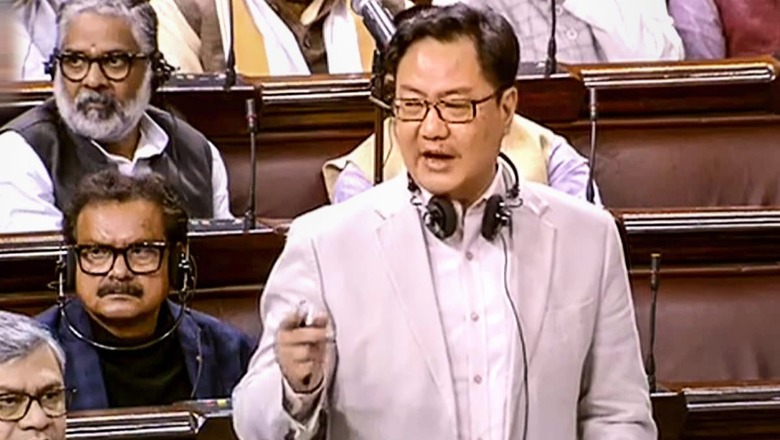
views
The government has emphasised on the need to finalise the Memorandum of Procedure (MoP) in its recent communication on January 6 this year to the Supreme Court of India and suggested that the Search-cum-Evaluation Committee in respect of appointment of judges in the Supreme Court and Chief Justices of High Courts should also consist of a representative nominated by the Government of India, Law Minister Kiren Rijiju told Parliament on Thursday.
“This, along with other measures suggested, shall pave the way for a more transparent, accountable and expeditious mechanism for appointment of Judges to the Constitutional Courts,” Rijiju said in his detailed answer, listing out the suggestions made by the government in its latest letter.
These suggestions are that for appointment of judges in the High Courts, the Committee should consist of a representative nominated by the Government of India and a representative of State Government(s) under the jurisdiction of High Court as nominated by the Chief Minister(s).
“It has been proposed that for appointment and transfer of Chief Justices and Judges of High Courts, the names recommended by the Chief Minister can be received by the Search-cum-Evaluation Committee along with the names taken from senior Judges outside the Collegium and eligible candidates taken from the database (Judicial Officers and Advocates) as maintained by the proposed Secretariat. The High Court Collegium may deliberate upon panel of names drawn up by the Search-cum-Evaluation Committee and recommend the names of most suitable candidates for appointment of Judges in the Supreme Court, Chief Justices and Judges of the High Courts,” Rijiju has spelt out.
He further said that a suggestion has been made that the Collegium at appropriate level may address the above requirements of drawing up panel of eligible candidates from aforementioned sources and draw up their proceedings by rendering requisite reasons and thereafter send the proposal to the government with relevant documents.
“Thus, the above mentioned Search-cum-Evaluation Committees will be entrusted to prepare a panel of eligible candidates from which the respective Collegiums will make recommendation,” Rijiju has said in his answer.
He listed out the government’s repeated communiques to the Supreme Court of India since 2016 over the finalisation of the MoP. He has said that the response of the SC Collegium on the views of the government on the revised draft MoP sent vide its last letter dated 11.07.2017 and 18.08.2021 were not yet received.
“Hon’ble Supreme Court while hearing WP(C) 13 of 2015 in NJAC matter issued a detailed order on 16-12-2015 on supplementing the MoP, which laid down that Government of India may finalize the MoP by supplementing it in consultation with the Chief Justice of India. The Chief Justice of India will take a decision based on the unanimous view of the Collegium comprising of four senior most puisne Judges of the Supreme Court,” Rijiju has said.
“The order stated that the following factors may be taken into consideration such as eligibility criterion, transparency in the appointment process, secretariat, complaint mechanism and miscellaneous matter considered appropriate for ensuring transparency and accountability including interaction with the recommendees by the Collegium of the SC without sacrificing the confidentiality of appointment.”
Rijiju said the Government of India, after due diligence, prepared and sent the revised draft MoP to the Chief Justice of India on 22.3.2016 on which the response of the Supreme Court Collegium (SSC) was received on 25.05.2016 and 01.07.2016. “The views of the government in response to the views of the SCC was conveyed to the CJI on 03.08.2016. Further comments of SCC on the views of the government on the draft MoP were received on 13.03.2017,” the Law Minister has said.
However, in a subsequent development, the Supreme Court, in suo motu contempt proceedings against a judge of the Calcutta High Court, pronounced a judgement on 04.07.2017 bringing out the system’s failure of not providing appropriate procedure for making assessment of the personality of the contemnor at the time of recommending his name for elevation inter-alia highlighting the need to revisit the process of selection and appointment of judges to the constitutional courts.
“The views of the Government on all these relevant points were conveyed to the Supreme Court of India vide letter dated 11.07.2017. Following another order of the Supreme Court dated 20.04.2021 in WP(C) No. 1236 of 2019, the Government again conveyed to the Supreme Court vide letter dated 18.8.2021 suggestions on draft for supplementing para 24 of the MoP,” Rijiju has said.
The original Memorandum of Procedure (MoP) was prepared in 1998 for the appointment of the judges of the constitutional courts. As per MoP, initiation of proposal for appointment of judges in the Supreme Court vests with the Chief Justice of India, while initiation of proposal for appointment of judges in High Courts vests with the Chief Justice of the concerned High Court.
All the names recommended by High Court Collegium are sent with the views of the government to the Supreme Court Collegium (SCC) for advice. The government, however, appoints only those persons as judges of High Courts who are recommended by SCC.
Rijiju further said that in order to replace the collegium system of appointments of judges to the Supreme Court and High Courts with a “more broad-based, transparent, accountable appointment mechanism and to bring greater objectivity in the system”, the government brought into operation the Constitution (99th Amendment) Act, 2014 and the National Judicial Appointments Commission Act, 2014 with effect from April 13, 2015.
However, the Supreme Court vide a judgment dated 16.10.2015 declared both the acts as unconstitutional and void, and the collegium system as existing prior to the enforcement of the 2014 Act was declared to be operative.
Read all the Latest India News here


















Comments
0 comment